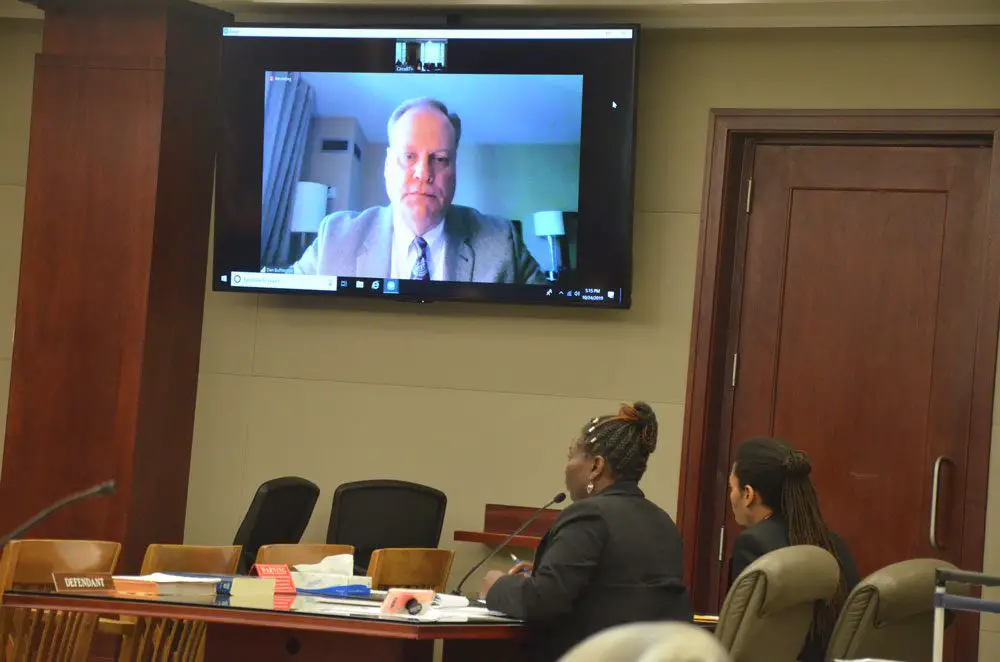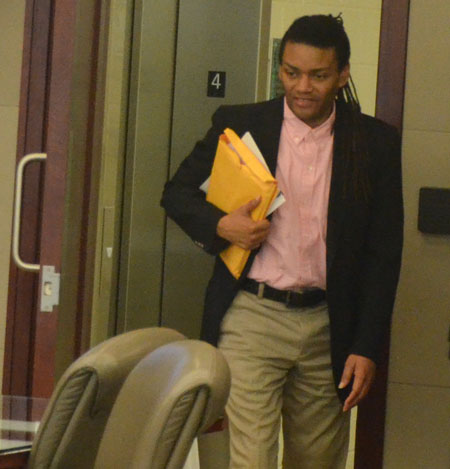
Wednesday was a day for powerful emotions in Victor Williams’s trial as the mother of the 16-year-old boy he is alleged to have drugged and raped a year ago in Palm Coast took the stand and effectively shook the jury with the anguish and anger she experienced after discovering her son passed out in front of the house.
Thursday the prosecution rested. Assistant Public Defender Regina Nunnally put on the witness she’s depending on most to turn the case around for her client, 43, for whom the case had gone poorly so far.
Williams’s prospects improved somewhat after the testimony of Daniel Buffington, a Tampa pharmacologist and toxicologist piped into the courtroom through Zoom, the video conferencing app. Buffington drew a series of question marks on the boy’s account of that night in so far as what effects the alcohol and drugs he took could have had on his impairment. Buffington’s conclusion: not much, and certainly nothing near what the boy described–drowsiness, blacking out, inability to walk to the bathroom.
But even the doctor never questioned whether the boy had been drugged. The focus was on amounts, not on whether, and that focus may itself end up impairing the defense, since a child is at the heart of the case, and the drugs consumed were all in the hands of the adult.
This much neither the boy nor Williams contend: late the night of Sept. 10, the boy contacted Williams, who lives nearby, to pick him up and take him to his house. Williams did. They’d met either six months or a year earlier on Grindr, a hook-up app for gays, bisexuals and transgender men. The boy says he used it to meet men who could give him drugs and alcohol, which is what he was seeking from Williams that night: he says he’d met Williams four times before for that reason, when no sex had been involved.
Williams had two cans of Four Loko in his fridge, which he says he bought soon before the boy showed up, and he’d made a margarita for him, which the boy said he “sipped,” and which Williams said the boy didn’t like. He preferred the Four Lokos. At some point the two had sex. The boy said he’d blacked out by then, and only woke up to find Williams grinding against him at one point, and giving him oral sex at another. Next thing he knew he woke up in his own bed at home the next day.
By then his father had found him sprawled on the front stoop of the house before work, and his mother had come home from her own job to care for him, as she would on and off between work and home for the rest of the day. The boy would not wake up until late afternoon or evening. Williams says he never drugged him, and if anything, poured out the second can of Four Loko to prevent him from drinking it. He concedes that he had sex with him–conceded it to the boy’s mother on Sept. 11, when she’d tracked him down and spoke to him by phone three or four times, one of them recorded by detectives. But he maintains that the sex was consensual at all times, that he never harmed the boy, and that the boy engaged in sex mutually.
The difference is crucial for Williams’s fate: he knows he’s going to prison one way or another. But he’s trying to limit his prison time to the punishment for statutory rape, which would be considerably less than the life term he faces if he is convicted of drugging and raping the boy.

“This kid is messed up, this kid is completely–he took something that didn’t affect him very well,” Detective George Hristakopoulos, who led the case, tells him.
“There was no opportunity for me to give him anything,” Williams says. But he was soon caught in a lie when he conceded to making a margarita after saying he hadn’t. “So you are only opposed to him drinking the Four Lokos but not the margarita,” the detective tells him.
“Your conversation tonight is completely treating us like we’re stupid, and you’re sugar-coating everything,” another detective told him. “If you’d like to have a conversation and actually be forthcoming, as honest and truthful to help yourself through this whole investigation, that would be fantastic at this point. You’re not doing anything to help yourself. You’re sugar-coating everything, you’re downplaying everything, you’re blaming everything on the child.”
It was more bluster and frustration than anything else, though it may have played well with the jury, and it left open the question of what had happened that would have resulted in the boy being so out of it when Williams dropped him off.
Buffinton, the pharmacologist, again and again, whether speaking to Nunnally or to Melissa Clark, the assistant state attorney, parried off any suggestion that the alcohol and drugs consumed that night could have left the boy in the state he was in the next day–or could have even led him to black out that night, as the boy said he did. At least not based on what the boy said he’d consumed: less than a glass of margarita, and less than a can of Four Loko, even though both types of drinks can be potent, plus some Xanax. “It’s just disingenuous to say that that amount of alcohol” the boy said he consumed, Buffington said, could have led “anywhere near a level that would have produced those types of effects.”
“The quantities described on that previous evening would absolutely not produce that depth or intensity of aftereffects the next morning,” Buffington said, “absolutely no residual pharmacological effects that would produce those things.”
Clark confronted Buffington with the long lists of side effects attached to the drug in question or to the drug when taken in combination with alcohol, but at every turn the doctor would qualify the answers with the facts of the small quantities consumed. His testimony ended more convincingly for Williams’s case than for the prosecution’s, whose own expert physician had spoken more in generalities than Buffington had–and that testimony was already two days old in the jury’s memory.
But that still leaves unexplained the state the boy was in when he was dropped off, or when he allegedly walked home: how he got home is also in contention. His mother described him as completely out of it, nearly catatonic, for a day. The lab tests a day later would not show anything other than the Xanax and the pot he said he consumed, and not in amounts that could convincingly determined how much he’d had of either the night in question.
Buffinton’s testimony may have achieved what Nunnally was seeking: raise questions, and therefore doubt, in the jury’s mind. No honest juror could hear Buffington’s testimony and not have doubts, though how reasonable those doubts would be are the key for Williams.
In the end, not even Williams denies that drugs were consumed: pot and Xanax, and so was alcohol. Nor does Williams deny that all three were consumed just before or around the time of the sexual encounter. For a 15-year-old boy with the frame of a waif, there’s no question that he was drugged. But was he impaired, or passed out? The prosecution may make the question moot if the issue is whether the boy was drugged at all at the time of the sexual encounter.
Williams has yet to take the stand. He’s expected to do so Friday, the last day of trial, not long before closing arguments, deliberations, and a verdict.





























Name (required) says
Sad this man was allowed to show up to court in anything but prison wardrobe and handcuffs. Watch, he’ll act so super surprised upon conviction. This unfortunate mother said it best.. “You F***ed my SON!” Case closed.
FlaglerLive says
He was not “allowed” to show up to court that way. It’s a constitutional protection for anyone on trial, so as not to prejudice the jury against an individual presumed innocent until proven otherwise.
Mary Fusco says
Name, sadly this young man was on an app looking for men. He got one but it didn’t turn out that great. Unfortunately, he will most likely be on another one as soon as this is over. These are the chances you take. It’s amazing how parents become so enraged and yet they have no idea what their kids are doing.
Commocimmon sense duden Sense dude says
Omg!!! Thank you, would parents and alleged victim please take 0.000009 % of responsibility for once
CB says
This type of mindset is exactly what is wrong with society. When we continue to blame victims or parents, instead of holding Criminals accountable. NO ONE has the right to rape a child, especially under the influence!
Susie Barr says
So both of you agree that someone that goes out ‘looking for men’ holds a specific amount of responsibly if they are drugged and raped? So your theology applies to anyone, man, woman, boy or girl correct? So people that rape, do have some rights to do so if you put yourself out there? Look a certain way, dress a certain way, drink and flirt? Those are all go signs to a possible rapist that its ok because the victim did something to attract an attack, right? Remeber that next time someone you know is raped. Look at them and ask them what they did to provoke a drugging and rape. Especially if its a young person who, as we all know don’t make sound decisions to begin with simply due to their age. Go ahead. Ask them. I dare you.
Beach Guy says
Looks more like a hotel room than an office, as described in the caption.